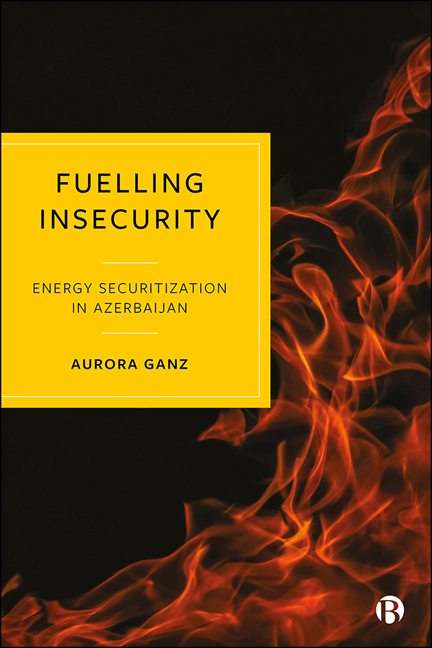Book contents
- Frontmatter
- Dedication
- Contents
- 1 Introduction
- 2 An Analysis of Actually Existing Energy Securitizations
- 3 Energy Securitization in the Land of Fire
- 4 Everyday Practices of Energy Security in Azerbaijan
- 5 Beyond the National Borders: NATO and Energy Security in Azerbaijan
- 6 Energy Securitization and the Private Sector: The Case of BP
- 7 Energy (In)Securitization: Abusive Security Practices and Poor Energy Choices
- 8 Conclusion
- References
- Index
2 - An Analysis of Actually Existing Energy Securitizations
Published online by Cambridge University Press: 13 May 2022
- Frontmatter
- Dedication
- Contents
- 1 Introduction
- 2 An Analysis of Actually Existing Energy Securitizations
- 3 Energy Securitization in the Land of Fire
- 4 Everyday Practices of Energy Security in Azerbaijan
- 5 Beyond the National Borders: NATO and Energy Security in Azerbaijan
- 6 Energy Securitization and the Private Sector: The Case of BP
- 7 Energy (In)Securitization: Abusive Security Practices and Poor Energy Choices
- 8 Conclusion
- References
- Index
Summary
This book explores energy securitization in Azerbaijan through an innovative approach to securitization theory, which combines discourse analysis to a practice-oriented approach. Overall, securitization studies champion a way of thinking that appreciates the possibility of change against the long metaphysical tradition of positivist theories of security and recognizes that security is inherently political. In this sense, securitization forces us to understand and question what is at stake in security – including the related forms of insecurity that security generates – and the conditions that make it possible. Securitization acknowledges security as an intersubjective process of construction, socially enacted and politically consequential, rather than as a universal and neutral value. This chapter locates the book's theoretical framework within the field of International Political Sociology (IPS) and its rediscovery of securitization beyond the early formulations of the School of Copenhagen and its speech act-centred theory. When developing the theoretical arguments underpinning the book, this chapter explains how a new, highly transdisciplinary, perspective of energy securitization can offer more latitude in understanding the complexity and heterogeneity of securitization. In particular, IPS moves away from the linguistic tradition of the speech act theory and grounds securitization in French and continental philosophy with the intent of fostering a more critical engagement with the politics of security. While still recognizing the importance of discourse, IPS positions language within a wider set of practices, the analysis of which can help identify and question the ways in which power and authority intersect. Against the rhetoric of the extraordinary highlighted by the School of Copenhagen, IPS demands attention to less spectacular forms of security: it brings into the analysis everyday practices and taken-for-granted forms of knowledge along with the attention to the discourses that fixate certain ideas of security and even disguise governmental practice.
This chapter starts with a reflection on the concept of energy security and its application; by doing so, it offers an exploration of the principal debates of energy security studies and sketches the conceptual trajectory of the phrase. It then introduces securitization as a theoretical framework to problematize the relationship between energy and security. Since its formulation at the end of the 1990s, securitization theory has experienced as much success as criticism and, to a certain extent, has followed the path of security studies, becoming something of a cottage industry – to steal Baldwin's metaphor.
- Type
- Chapter
- Information
- Fuelling InsecurityEnergy Securitization in Azerbaijan, pp. 26 - 51Publisher: Bristol University PressPrint publication year: 2021

